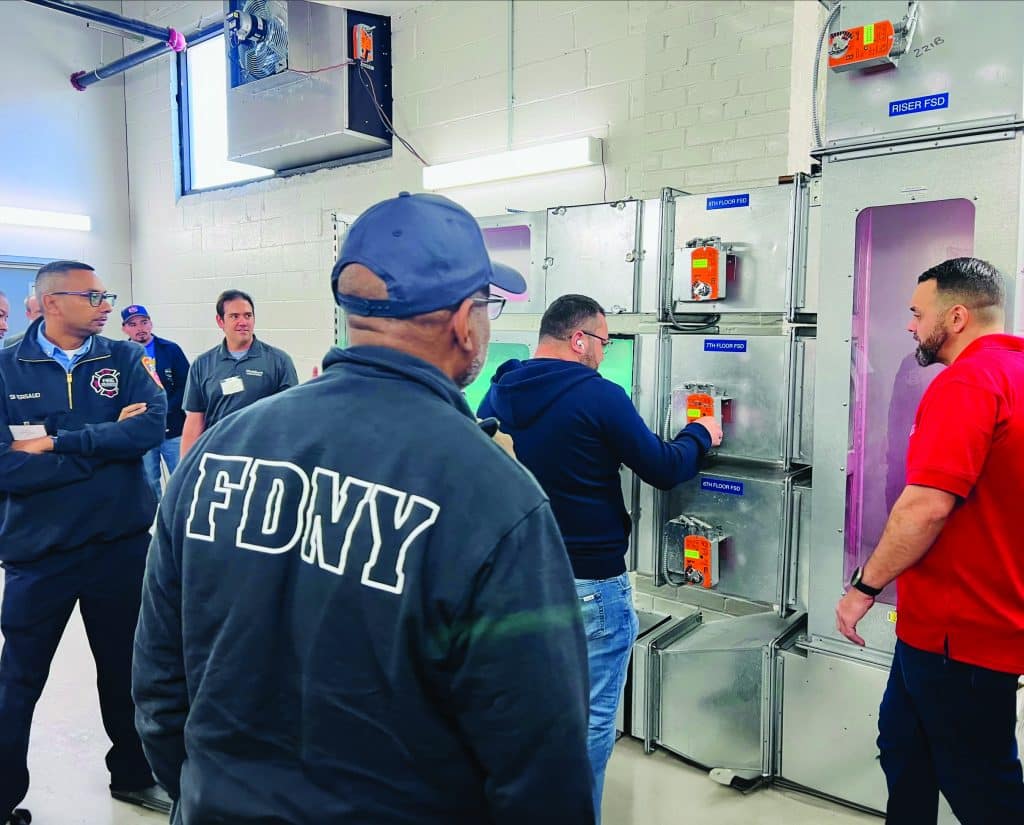For nearly two decades, sheet metal professionals have encouraged public and private entities to inspect fire and smoke dampers, to maintain they’re in working order based on design guidelines. Dampers save lives, and when they’re misused, broken or compromised in any way, they can no longer perform their function — allowing building occupants to get out of danger and helping first responders enter to gain control.

In the last year, the National Energy Management Institute (NEMI), the National Fire Protection Association (NFPA), the Sheet Metal and Air Conditioning Contractors’ National Association (SMACNA) and local sheet metal unions and training centers across the country came together to educate fire professionals — from firefighters to captains, fire marshals and fire inspectors — on the updated city, state and regional fire codes, how dampers work and obstacles to look for, and who to call with questions.
Sheet metal professionals share their industry knowledge with fire professionals in order to save lives. And in the process, they create a bridge where information can flow, said Josh Hunter, NEMI southeastern field representative.
“We want to garner relationships with the fire marshals, fire inspectors and also with the contractors,” he said. “We invited officials with the local [union] in the area, too, so they know there is a resource in their area they can call. We try to get everyone on board and networked together.”
By the end of 2023, the fire life safety and smoke control systems presentation had been held in cooperation with the union and training sides of the International Association of Sheet Metal, Air, Rail and Transportation (SMART) workers, including Local 104 in Northern California; Local 28 in New York; Local 88 in Las Vegas; Local 85 near Atlanta; Local 16 in Portland, Oregon; Local 105 in Southern California and Local 10 in Minnesota.
“We’re trying to get more involved in making sure the fire dampers are being inspected regularly as they’re supposed to be,” said Steve Langley, business manager of Local 85.
“We cover the whole state of Georgia and three counties in Alabama,” added Schuyler Worthey, Local 85 business agent and former testing, adjusting and balancing (TAB) and fire life safety technician. “So, it’s very important for Local 85 to stay in contact with them. My line is always open to them to contact me.”
Most of the classes have included two sections: inspection and demonstration. In many cities, fire professionals are invited to get up close with working and non-working dampers, provided by the local or regional area, and experience stairway pressurization and/or smoke control systems through demonstration units. Fire professionals also are given the newest edition of the SMACNA manual.
Sharing information is key to saving lives and ensuring buildings are safe.
“It’s an awareness,” said Kenneth Boskett, TAB and fire life safety instructor for Local 88. “These are fire professionals. They know what they’re doing. There’s a curtain that divides what we input into fire life safety and what they know about what we put into fire life safety. When they’re made aware, they can start making considerations.”
“It’s about creating the relationships with the inspectors and educating them on what we do,” said Dion Abril, executive administrator of the Western States Council, which brings unions and contractors together. “We also provide them with the tools and the knowledge to ask contractors during the inspections the correct questions and to understand what the process was for the inspection, the maintenance. We’re helping them gain the tools they need to enforce what is already in the fire code.”
At Sheet Metal Workers Local 104 Bay Area Industry Training Fund, fire professionals witnessed damper failure and experienced various air pressure differentials due to a simulator on site.
“They’re used to what normal is in the correct building, but when things go wrong, they don’t have that experience of how failures change things,” said Pat Pico, training coordinator at Local 104 and Testing, Adjusting and Balancing Bureau (TABB) Hall of Fame member. “We were able to show them different types of failures for fire-smoke damper components, failures we see out in the field, and components that are not regularly tested.”
Feedback from fire professionals at all locations has been overwhelmingly positive, and the communications lines have opened. Some of the classes were requested through NEMI based on the previous presentation’s success, Hunter said.
“When I get out in front of these fire professionals, I’m throwing a lot of information at them, but as they look at the dampers, roll them around in their hands, open and close them, you see we are giving them information they can really use,” said Chris Ruch, NEMI director of education.
“The collaboration with NFPA and SMACNA has been invaluable. NFPA can provide regional, state and city code updates and information. SMACNA introduces them to the correct installation, so they not only know what they’re looking at, they have the literature to refer back to. And the locals and contractors give them local ties to call when they have a question and a training center to visit for more information.”
“There are a lot of agencies that refer to the NFPA standards for their state or city fire codes. It’s a big deal to have them working with us,” Hunter added. “They’re known across the United States. They are a source for states to develop code.”
More presentations are on deck for 2024, to be held in training facilities, where applicable, and NEMI is working on getting the fire life safety and smoke control systems presentation included in firefighter academy trainings. Connecting local fire professionals to local fire life safety professionals and their training facilities is important to keep the flow of information open and continuing ongoing training, Hunter said.
“We’d like to hold the classes at training facilities,” he said. “It builds the fire inspectors and marshals’ confidence in the certification the [SMART] members hold.”